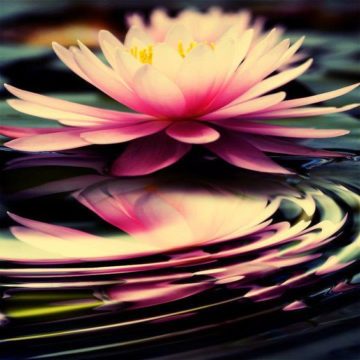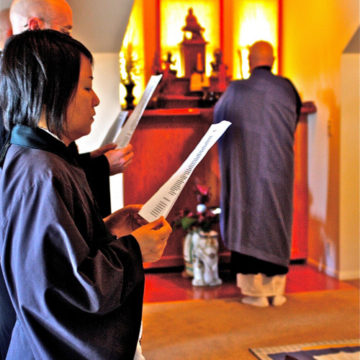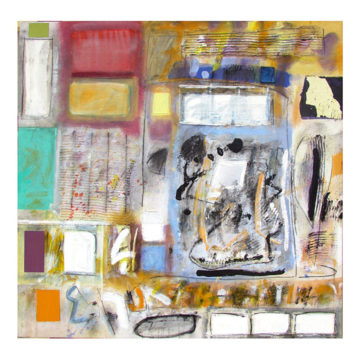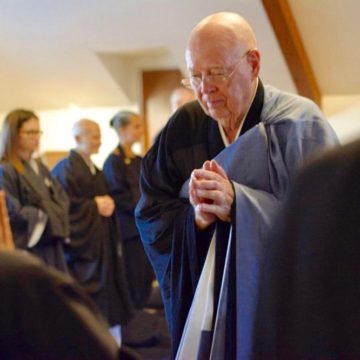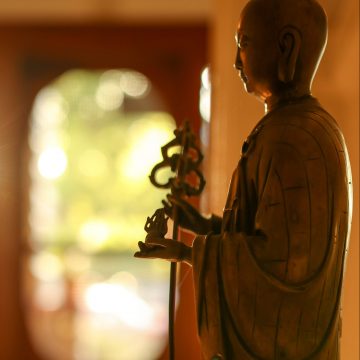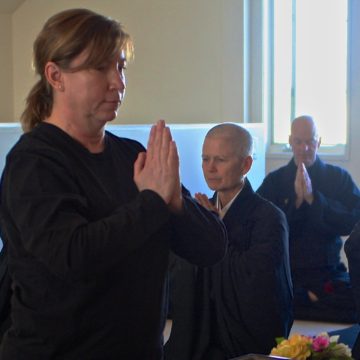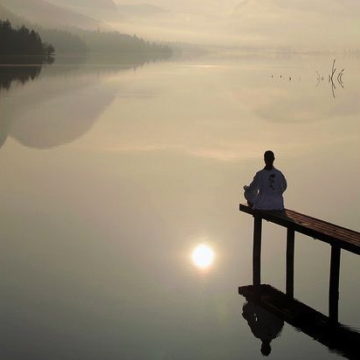In a talk that begins with a famous koan about a flag waving in the breeze, Nyogen Roshi encourages us to move beyond the limitations of the chattering mind that we mistake for our true self. Discovering who we really are sounds daunting, but Roshi helps us keep things in perspective…
audio
Ordinary Mind
In one of the most famous Zen stories, Joshu asks his teacher Nansen, “What is the Way?” Nansen replies, ” Ordinary mind is the Way.” What is ordinary mind? Nyogen Roshi walks us into it. “Get quiet,” he says. “Purify the mind–which means stop talking to yourself. Just sit here in the present moment. What else is there to be known? You know everything there is, perfectly.”
Chanting Services
Services introduce the aspect of ritual into our practice. Specifically, a “service” consists of a chant, performed in front of the altar, to transmit the energy, intention and benefit of our practice into the world we inhabit. In one way, rituals are an external expression of our inner state. At the same time, we strengthen and reinforce our inner state by the external chant. The service brings together what we think of as “inside” and “outside” into a unified whole.
The Basic Teaching
In a powerful and wide-ranging talk, Nyogen Roshi touches on quantum physics and the delusion of understanding; how to listen to a talk; the importance of knowing how to die well; and how his last dokusan with Maezumi Roshi, his teacher, illuminates an exchange between Obaku and Rinzai…
You’re in the Bardo Right Now
In a recent talk on the Bardo–the transition between life and death–Nyogen Roshi highlights an insight from a modern Tibetan master’s commentary on a classic text: Each of us exists in the Bardo right now…
Right View
After a particularly beautiful period of meditation, Nyogen Roshi is prompted to share his inner experience of zazen. Though setting aside striving and expectation can be difficult, the rewards are beyond measure. “You relax and release,” Roshi tells us, “then at a certain point, you begin to feel good, and the sitting itself becomes rich. You experience the wonder of what you truly are.”
The Issue of Suffering
The image of a migrant father and his young daughter lying dead on a bank of the Rio Grande prompts Nyogen Roshi to reflect on Buddhist teachings around suffering. Drawing on his own experiences with suffering as well as lessons handed down in the Zen tradition, Roshi concludes that the story of the Buddha contains the only possible remedy. “Who else other than yourself is sitting there?” Roshi says. “You can only look into your own mind. If you can understand where the pathway is, simply trust the words of the Buddha. His own life was the prescription and the path.”
Vast Emptiness
Karma is real, Nyogen Roshi reminds us. Zen practice is real. What do we see when practice allows us a glimpse of our world as it truly is? The vast emptiness that Bodhidharma spoke about in his exchange with Emperor Wu. What do most of us do when we catch that glimpse? “You turn it into a concept,” Roshi tells us. “What you’re holding onto now is delusion! You have to keep stepping into each new moment. That’s the point to our practice.”
This Is Where I Am Today
Patrice Taisho Bucher’s poignant talk about caring for her elderly parents in her hometown of New Orleans reminds us that serious Zen practice can sometimes feel like trying to be quiet when you’re caught in a whirlwind. But the rewards are priceless…
Realizing Dharma
In this passionate summary of his teaching, Nyogen Roshi exhorts us to put aside the intellectual pursuit of Dharma–the true nature of each one of us. Realizing our true nature can only be accomplished through practice. “You truly are the Dharma,” Roshi says. “You truly are the Way. But do you understand what that means? No! You can’t understand that. You can only be that.”
Undivided Activity
Weaving some of Maezumi Roshi’s commentary into a talk on Zenki—”undivided activity”—Nyogen Roshi reminds us that all the Buddhist teachings are pointing directly at the individuals who receive them. “What is Buddha?” Roshi asks. “Buddha is awake! Who is awake? Is there anyone there but yourself?”
Awareness
In a powerful talk that touches on the six perfections in Buddhism as well as Dogen’s writing on samsara and nirvana, Nyogen Roshi exhorts us to cultivate selfless awareness through our practice…


